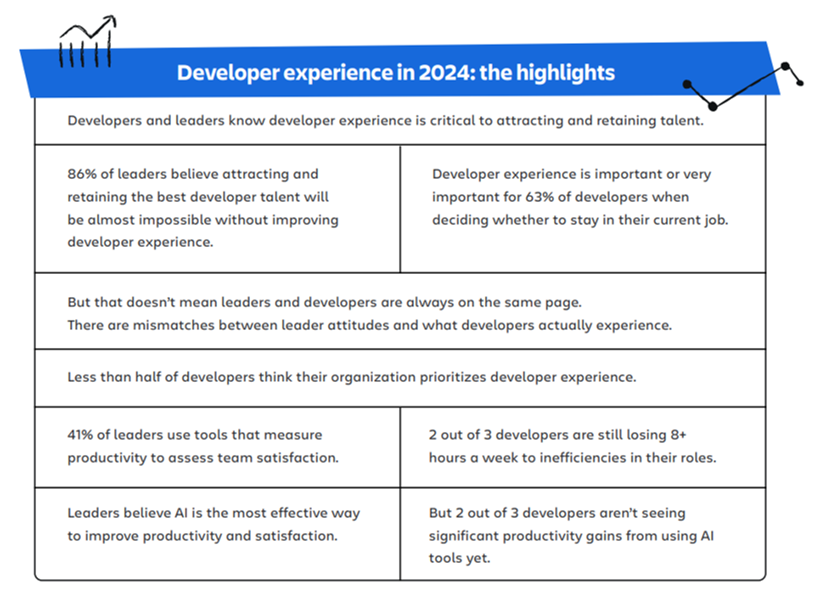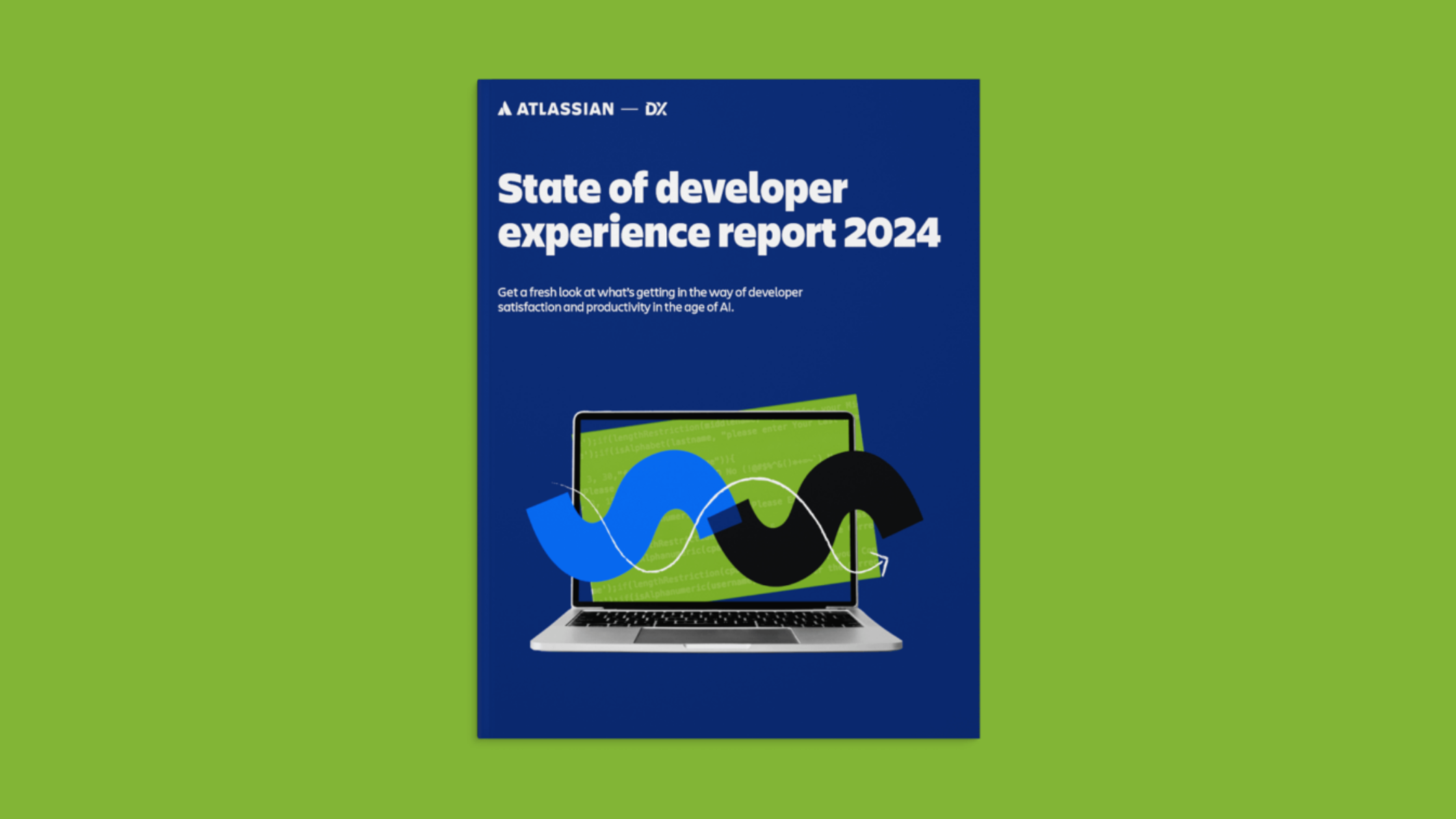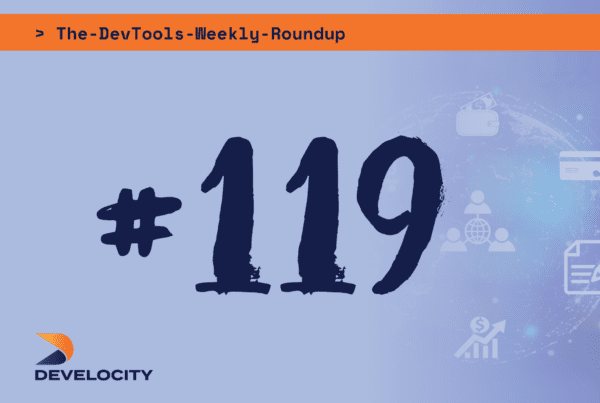At Develocity, we understand that finding the right talent is only the beginning. Ensuring that these talented professionals thrive in their roles is equally important, especially in the developer tools sector, where innovation is rapid and relentless. The recently released *State of Developer Experience Report 2024* by Atlassian offers crucial insights into developer productivity and satisfaction. We highly recommend heading over to the link here and downloading a copy for yourself, but in the meantime, here’s a very quick overview.
“Atlassian engineering is betting big on the idea that carrots are more effective than sticks. If we make developers’ jobs more satisfying, we believe productivity will improve organically.” – Rajeev Rajan (CTO at Atlassian)
Few Notes on the Research First
- Atlassian partnered with Wakefield Research and DX to conduct survey and analyse and produce results and recommendations for engineering leaders
- 2100+ developers and managers across a range of industries were surveyed
- At a high-level the main focus was “looking at what keeps work flowing smoothly vs. what introduces friction, and how they feel about their work environments int he age of microservices and AI”

Developer Experience in 2024 – The Highlights (Source: Atlassian State of Developer Experience Survey 2024)
The Productivity Puzzle
One of the report’s standout revelations is that developer productivity remains a poorly understood and supported area. Despite increased interest, less than half of the surveyed developers feel that their organizations adequately prioritize their experience. This is concerning, as 69% of developers report losing eight or more hours weekly to inefficiencies, and most don’t believe that their leaders are aware of the issues. The top culprits?
- Technical debt
- Insufficient documentation
- Cumbersome build processes
- Lack of time for deep work
- Lack of clear direction
According to the engineering leaders themselves, the top five contributors to developer complexity are:-
- Understaffing
- Expansion of the developer role
- New technology
- Switching context between tools
- Collaboration with other teams
It seems there is much need for better communication between developers and their leads.
Measuring productivity remains one of the biggest challenges. Organizations are using a variety of metric gauge developer productivity but many find them to be ineffective. Findings of this study included:-
- Common metrics include lines of code, story points completed, and hours worked
- Over half of leaders using these metrics find them ineffective for measuring real productivity
- 38% of organizations measure productivity by hours worked, despite 69% of developers losing significant time to inefficiencies
The Role of AI in Developer Workflows
AI tools, often heralded as game-changers, are yet to deliver the expected productivity boosts.
- Two-thirds of developers are not seeing significant improvements, with 30% noting no productivity gains from AI tools.
- 38% of developers reported seeing more than moderate productivity grains from AI tools so far.
- Leaders, remain optimistic, with 37% believing that AI automation will enhance productivity and job satisfaction.
- Developers are optimistic about AI’s future impact, with 61% expecting moderate to extreme improvements in the next two years.
This mismatch highlights the need for more exploration and better alignment between leadership expectations and developer experiences.
The Cost of Inefficiencies
The report underscores the financial impact of lost productivity. For example, in an organization with 500 developers, losing eight hours per week to inefficiencies can cost approximately $6.9 million annually. This staggering figure emphasizes the urgent need to address the root causes of these inefficiencies, such as lack of clear direction and inadequate focus time.
The Developer Experience Connection
There’s growing recognition that developer experience and productivity are closely linked:
- 86% of leaders believe improving developer experience is critical for attracting and retaining talent.
- 63% of developers say experience is important in deciding whether to stay at their current job.
- However, only 23% of developers are satisfied with their team’s investment in experience improvements.
Strategies for Improvement
The report doesn’t just highlight issues; it offers solutions. Leaders believe that improving developer experience requires a multifaceted approach, including;-
- implementing AI automations
- providing better collaboration tools,
- encouraging risk-taking,
- streamlining decision-making processes,
- hosting hackathons and other creative events.
Notably, fostering a positive developer experience can significantly enhance both productivity and satisfaction. This includes maintaining manageable cognitive loads and ensuring developers can reach a “flow state”—a key aspect of a productive work environment.
Moving Forward
At Develocity, we see these insights as crucial for our clients in the developer tools sector. As the demand for top-tier talent grows, understanding and improving developer experience becomes a strategic priority. The *State of Developer Experience Report 2024* provides a roadmap for organizations looking to enhance productivity and retain their best talent. By addressing the identified pain points and implementing suggested improvements, companies can create an environment where developers not only succeed but also find joy in their work.
For startups and scaleups, these findings are a call to action. As we partner with companies to find the right talent, we also encourage a focus on creating a supportive and efficient work environment. After all, a satisfied developer is a productive developer, and in this competitive market, ensuring developer happiness is key to unlocking their full potential…and the full potential of your business.



